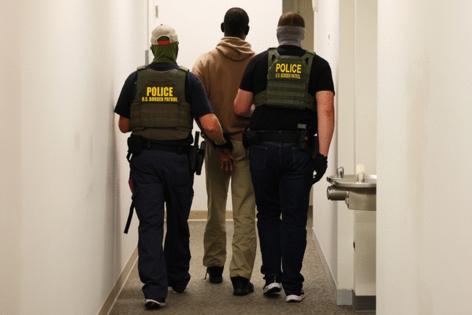Patricia Lopez: ICE is redefining detention as an open-ended threat
Published in Op Eds
Mandatory detention is the newest and potentially most powerful weapon in the White House’s arsenal for turbo-charging deportations. Once arrested, immigrants without legal status will, with few exceptions, be held in custody until they are deported by Immigration and Customs Enforcement. That means they are no longer eligible, as in the past, to post bond at a hearing and have an immigration judge decide their fate. ICE alone will be the decider.
That threatens to transform temporary detention centers into long-term prisons — and to strip immigrants of the constitutional rights that are due to every person in the U.S., regardless of legal status.
Acting ICE Director Todd M. Lyons wrote in a July memo obtained by the Washington Post that immigrants should be detained “for the duration of their removal proceedings,” a process that can stretch out for months, or even years, given judicial backlogs. That could affect millions of immigrants.
It is an aggressive move from an agency that is becoming increasingly reckless in its handling of immigrants. The policy is already expected to draw a court challenge questioning the constitutionality of sidestepping judges.
David Bier, director of immigration studies for the libertarian Cato Institute, told me it is part of a strategy to gain “total control” over the removal process. “Judges make an independent determination based on facts,” he said. “They’re not going to just do what ICE wants.” Once the norm, such independence now seems to strike this administration as an intolerable act of defiance.
Even before the new policy was announced, it had become common since Trump took office for judges to approve dismissal of deportation proceedings against an immigrant only to have ICE officers arrest the person in the court’s hallway and fast-track their deportation.
Perversely, this new tactic punishes the very immigrants who stand the best chance to become eligible for asylum or another legal status, Bier said, adding that “these are the immigrants who usually have clean records, steady jobs. They are complying.”
That compliance also makes them easy marks for a dragnet that makes little distinction between high- and low-priority removals. ICE agents struggling to meet the quotas of Stephen Miller, the White House deputy chief of staff, are looking for quick wins. It is far easier to arrest someone who shows up to a regular check-in than to hunt down a criminal who left no forwarding address.
ICE is still far short of the holding facilities needed for its bumped-up enforcement efforts, but the agency has made its intentions clear: Temporary tent facilities such as “Alligator Alcatraz” in the Florida Everglades may become the new template, even as existing detention centers fill to bursting. In the tax-and-spending law signed at the beginning of July, the agency received funding for a capacity of 100,000 beds.
“The idea,” Bier said, “is to force them into a choice of being detained for months or even years, or just give up and leave.”
This is just wrong; someone with a good case for asylum should not be facing imprisonment until they self-deport. Stepped-up detentions, while falling well short of White House goals, have already resulted in reports of overcrowding, inadequate food and lack of medical attention — all for people who, in many instances, face no criminal charges.
Under normal circumstances, those in detention would get top priority for a hearing within one to two weeks, according to acting ICE director Lyons. But a backlog of an estimated 3.5 million cases makes that unlikely. So does the shortage of immigration judges. Although the White House has said it will hire more judges, since Trump took office, more than 100 immigration judges have resigned or been fired.
Democratic U.S. Senator Dick Durbin of Illinois said at least one of those firings was punishment for a judge who “took time to show me the court and explain its functions.” The judge, he said, later received a Justice Department email that stated immigration judges should not be talking directly with members of Congress. Durbin, the ranking member on the Senate Judiciary Committee, called the judge’s abrupt termination an “abuse of power.” More beds mean more detentions. Fewer judges mean those immigrants might be imprisoned longer — a lot longer. And those who believe they have the best shot at legal status will be the most determined to gut it out, for as long as it takes.
The result could be the deliberate, long-term imprisonment of individuals not convicted of a crime.
Under the Constitution, both immigrants and citizens have a right to due process and equal treatment under the law. If the Constitution is to have any meaning at all, those rights cannot become just another casualty.
Congress has given ICE a budget that is 62% larger than that of the entire federal prison system, according to calculations by the non-partisan American Immigration Council. Under the new tax law, its budget for enforcement and removal operations will triple. ICE now has ample resources to do this the right way: Hunt down criminals and deport them. Hire more judges who are well-qualified and independent. Insist on humane treatment in what should be short-term detention facilities. There are no longer excuses not to do so, and the American public should demand it.
_____
This column reflects the personal views of the author and does not necessarily reflect the opinion of the editorial board or Bloomberg LP and its owners.
Patricia Lopez is a Bloomberg Opinion columnist covering politics and policy. She is a former member of the editorial board at the Minneapolis Star Tribune, where she also worked as a senior political editor and reporter.
_____
©2025 Bloomberg L.P. Visit bloomberg.com/opinion. Distributed by Tribune Content Agency, LLC.

























































Comments